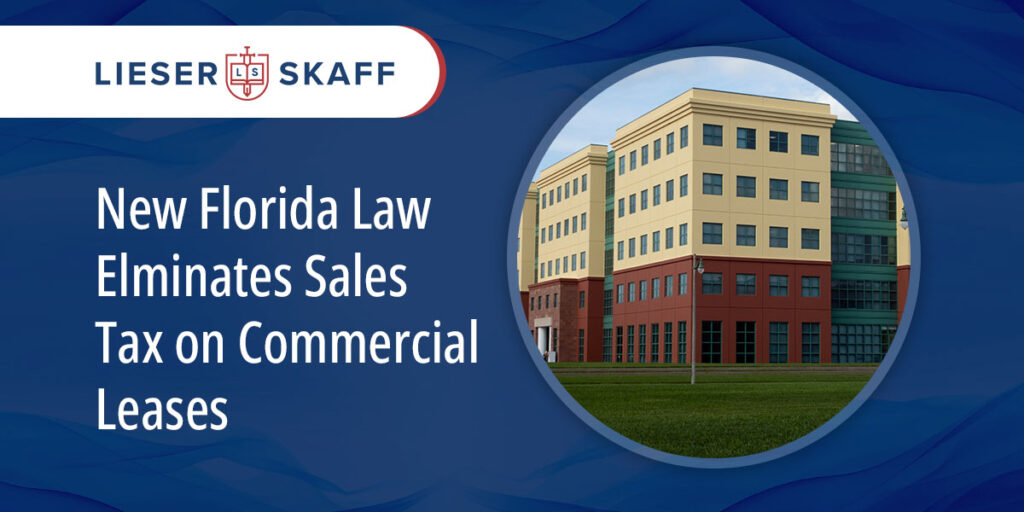Following years of gradual reductions in the tax rate, HB 7031 was signed into law on June 30, 2025, completely eliminating the Florida sales tax on commercial leases and signifying a major development for the commercial real estate industry in Florida. With the change set to take effect on October 1, 2025, both landlords and tenants should understand the likely implications of the law for both existing and future commercial leases.
What Was Florida’s Commercial Lease Sales Tax?
Known as the Florida Business Rent Tax (BRT), the State of Florida has long imposed a tax on commercial real estate leases such as those covering office, retail, and industrial space. Although incremental reductions in the BRT tax rate have occurred in recent years, reducing the rate from six percent to two percent, Florida remains the only state in the country taxing commercial leases. The BRT tax applied not only to base rent, but to other charges that fell under the definition of “rent” under the terms of a commercial lease, including payments for things such as ad valorem taxes, common area maintenance (CAM) costs, and insurance costs. Moreover, along with paying a tax to the State of Florida, tenants were obligated to pay a local “discretionary surtax” to the county in which the property was located. Collectively, the money paid in BRT taxes could add up to a significant sum over the lifetime of a commercial lease agreement. For example, imagine that you entered into a five-year lease agreement to rent commercial office space at the rate of $10,000 per month. Even at the current two percent rate, you would pay a minimum of $12,000 in BRT taxes over the course of the lease. With the passage of HB 7031, the BRT tax has been eliminated at both the state and county level.

How Will the Elimination of the Commercial Lease Sales Tax Impact Landlords and Tenants?
In the long run, the elimination of the commercial lease sales tax is a win-win for both landlords and tenants. The prospect of saving thousands of dollars over the course of a lease undoubtedly makes Florida an even more attractive option for commercial tenants who are thinking about renting property in the state. Landlords also benefit from the elimination of the tax as it puts them in a more competitive position with prospective commercial tenants comparing properties in several states.
For commercial tenants who are currently locked into a long-term lease, or who have renewal or extension options, the benefits may be noticeably greater. While landlords may eventually adjust rental rates upward because tenants are no longer obligated to pay BRT taxes, existing lease terms are typically fixed. As such, commercial tenants will continue to pay their monthly rent pursuant to the terms of their existing lease without the additional expense associated with the commercial lease sales tax. For commercial tenants, this could be a savings of tens of thousands of dollars per year for the duration of the lease, making existing commercial leases extremely valuable.
What Steps Should Commercial Landlords and Tenants Take in Light of the Tax Changes?
The elimination of the commercial lease sales tax is a long-awaited and welcome development for the business and real estate communities in Florida. If you are a landlord or tenant in an existing commercial lease, there are several steps you should take to prepare for the upcoming changes, including:
- Review your lease. Take the time to thoroughly review your existing lease agreement to ensure that you understand how the commercial lease sales tax has been applied to payments made under the lease. Understanding what portion of the monthly lease payment is attributable to tax payments is crucial to determining the new monthly lease payment amount starting October 1st.
- Communicate with parties to the lease. All parties to an existing lease agreement should be made aware of the upcoming tax change. Whether you are a landlord or a tenant, opening a dialogue with the other party now ensures that all parties know what to expect when the law takes effect. You may also wish to discuss how overpayments will be handled in the event that taxes are inadvertently collected after October 1st.
- Address renewal/extension options. If you are a commercial tenant and your lease agreement includes the option to renew or extend your lease, you may need to reevaluate that option as it may now be more valuable.
- Consult with a real estate attorney. Because every commercial lease agreement is unique, you may need to consult with an experienced Florida real estate attorney to ensure that you have a clear understanding of how the elimination of the commercial lease sales tax will impact your existing lease agreement.
Consult the Real Estate Attorneys at Lieser Skaff
If you have questions or concerns about the elimination of the commercial lease sales tax in Florida, consult with the experienced real estate attorneys at Lieser Skaff.
